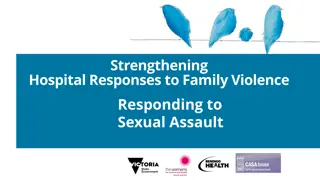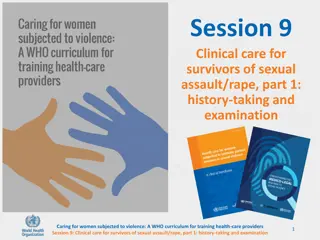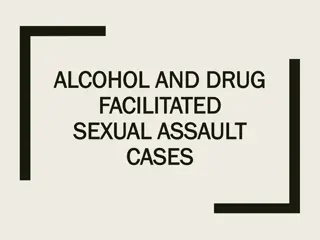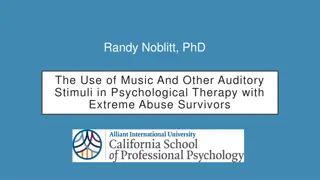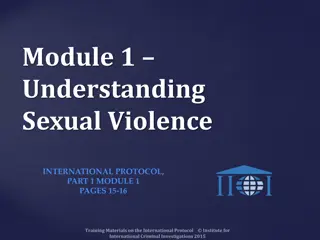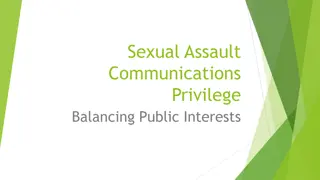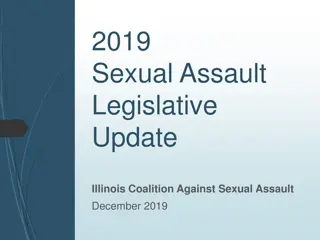Healing Together: Understanding Relationships Among Sexual Assault Survivors in Group Therapy
Qualitative study delves into the relationships among sexual assault survivors in group therapy, exploring how social support and shared trauma impact their healing processes. The study aims to uncover beneficial factors, coping mechanisms, and the effects of vicarious traumatization in a virtual therapy group setting.
Download Presentation

Please find below an Image/Link to download the presentation.
The content on the website is provided AS IS for your information and personal use only. It may not be sold, licensed, or shared on other websites without obtaining consent from the author.If you encounter any issues during the download, it is possible that the publisher has removed the file from their server.
You are allowed to download the files provided on this website for personal or commercial use, subject to the condition that they are used lawfully. All files are the property of their respective owners.
The content on the website is provided AS IS for your information and personal use only. It may not be sold, licensed, or shared on other websites without obtaining consent from the author.
E N D
Presentation Transcript
Does it hurt qualitative study of the relationships among Sexual assault survivors in group therapy Does it hurt And heal? A qualitative study of the relationships among Sexual assault survivors in group therapy heal? A Brittni Gettys M.S., Autumn Greene, Sydney Monaghan WCU s Virtual Research and Creativity Day April 29th2021
35% of women worldwide Why study sexual assault survivors? 1 in 3 women & 1 in 6 men will experience sexual assault in U.S. Members of the LGBTQIA community at increased risk Annually costs the U.S. $127 billion 30-50% of sexual assault survivors will be diagnosed with PTSD
Social Support Serves as a protective factor for the development of PTSD. Promotes self-worth, well-being and efficacy Method for coping from the effects of traumatic experiences
Group Therapy for Sexual Trauma Provides context to study relationships among survivors Understanding through shared experiences Provide support that may not be available in survivors social networks
Vicarious Traumatization Originally coined by McCann and Pearlman (1990) The impact of traumatic stress derived from being exposed to a victim s explicit account of a traumatic event. Explored in the literature via therapist/client relational dyad, as well as first responders, emergency medical services, fire services, law enforcement, medical professionals, rape crisis and domestic violence counselors, social workers, and advocacy personnel.
Shared Trauma Occurs when a therapist AND client have experienced a similar traumatic event at some point in their lifetime. Likely that this dynamic occurs between survivors as they help each other while healing from similar traumatic experiences
What are the beneficial and protective factors? How do SA survivors utilize each other for social support within a group therapeutic context? What is the experience of survivors as they help peer survivors process and recover from similar traumatic experiences? How are survivors affected by exposure to shared trauma? How do they cope? Virtual therapy groups Study Objectives
Selected from sexual assault support groups from college counseling centers and non-profit sexual assault victim services organizations. a) they are currently participating in a support group for sexual assault survivors and Participants (b) they are eighteen years of age or older. 4-6 individuals Individuals of all ages, races/ethnicity, sexual orientations, gender identities, and socioeconomic classes will be invited to participate in the research, given they meet the inclusion criteria
Method Interview Protocol The potential healing effects of group therapy for sexual trauma The extent with which relationships among sexual assault survivors facilitated healing and trauma recovery Experiences of shared trauma or vicarious traumatization during participation in group therapy How participants' coped with exposure to the sexual trauma of other group members
Semi-Structured Interview Protocol Questions designed by the primary researcher include the following: Are there any helpful aspects of this group or some things you like about this group? Are there any things about the group that you wish were different anything you find unhelpful or that you don t like? When you hear others share their experiences in the group, does it make you think of your own experiences? If so, is that helpful--how? Is it uncomfortable--how? Do you see group leaders help to manage the thoughts and feelings of all group members? In other words, do group leaders seem to know how to respond when members are sharing about traumatic experiences? What do you think could be done to better support survivors in their healing process?
Procedure Fliers disseminated to agencies. Group leaders will disseminate fliers and provide information to the group members about the purpose of the study and will invite group members to participate in the semi-structured interview. Group members sign the consent form and schedule an interview with the PI via a HIPPA compliant secure email service. Interviews conducted remotely from an audio/visual recording lab in Wayne Hall Recordings will be stored in a locked filing cabinet in the lab that only the PI, research team and dissertation supervisor have access to. The PI and research team will de-identify and transcribe and the recordings for coding and data analysis.
Data Analysis The analytic approach for this research will follow the coding steps of thematic analysis outlined by Braun & Clarke (2006). Results will be analyzed through generating initial codes from the data set of participant interviews, analyzing codes to find and define themes, and lastly selecting the participants' statements to provide examples of themes across the data set. This qualitative study will utilize multiple coders and inter-rater reliability will be calculated to increase reliability of the coding procedure and identified themes.
Expand the current literature on sexual assault Increased understanding of buffering and supportive effects among sexual assault survivors and how these effects act as aids in the healing process Further clarity on variables related to the effect of group therapy for sexual assault survivors and inform group treatment of sexual assault survivors Implications Ientify and discover potential risks of group treatment including re-traumatization and vicarious traumatization to sexual assault survivors when sharing experiences and how clinicians can help mitigate this risk Add to the currently limited research on virtual modalities of mental health services




